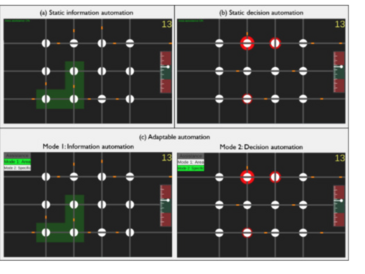Michèle Rieth, Linda Onnasch, Vera Hagemann
International Journal of Human-Computer Studies 186 (2024): 103246
doi: 10.1016/j.ijhcs.2024.103246
This experiment systematically examines whether, in safety-critical environments such as Air Traffic Control, the negative effects of increasing automation associated with static automation concepts can be mitigated by adaptable automation. Adaptable automation is a form of flexible automation in which the human operator (rather than the system as in adaptive automation) can decide when and to what extent to delegate tasks. A special focus is on its effects on human perception in terms of perceived autonomy and competence, satisfaction, and human role perception. We conducted two online studies using the same dual-task paradigm. Study 1 was conducted with a novice sample via Prolific (N = 93) and study 2 with an expert sample of Air Traffic Controllers (N = 126). Participants were either supported by static information automation, static decision automation, or an adaptable solution that allowed them to switch between the two automation stages. The findings of both studies are similar. Results indicated that, even when humans rarely switched, adaptable automation could increase perceived autonomy, led to high satisfaction, and had positive effects on role perceptions without impairing performance or workload. Furthermore, satisfaction was found to correlate with performance. From a human-centered perspective, flexible concepts seem to be particularly suitable when automation increasingly takes over parts of a job task not only at the stage of information analysis but also at the stage of decision-making.
© 2024 The Authors, CC BY 4.0, published by Elsevier Ltd.

